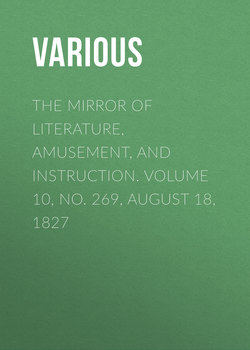The Mirror of Literature, Amusement, and Instruction. Volume 10, No. 269, August 18, 1827

Реклама. ООО «ЛитРес», ИНН: 7719571260.
Оглавление
Various. The Mirror of Literature, Amusement, and Instruction. Volume 10, No. 269, August 18, 1827
DUKE OF DEVONSHIRE'S VILLA, CHISWICK
THE SKETCH-BOOK
MY COMMON-PLACE BOOK,
MISCELLANIES
ANCIENT POWDER FLASK
SPIRIT OF THE PUBLIC JOURNALS
THE SELECTOR, AND LITERARY NOTICES OF NEW WORKS
THE LECTURER
USEFUL DOMESTIC HINTS
ARTS AND SCIENCES
THE GATHERER
Отрывок из книги
Talk of musquitoes!—a musquito is a gentleman who honourably runs you through with a small sword, and from whom (as from a mad dog) we may easily seek a defence in—muslin.
But your rory-tory, hurly-burly blue-bottle, is no better than a bully. His head is a humming-top, and his tight blue little body like a tomahawk, cased in glittering steel, which he takes a delight in whirling against your head. I really believe, that to confine a nervous man in a room with one of these winged tormentors, on a July day, would inevitably destroy him in less than an hour.
.....
Your noisy people generally grow taciturn in their cups—but Sir Blue-bottle, though he drinks deep draughts of your wine, particularly if it abound in sweetness, is never changed. He is naturally giddy, and according to entomologists, always sees more than double, while his head was never made to be turned. So may you hope for peace—only in his flight or death!—Absurdities: in Prose and Verse.
William the Conqueror entertained the difficult project of totally abolishing the English language, and for that purpose, he ordered that in all schools throughout the kingdom, the youth should be instructed in the French tongue. Until the reign of Edward III. the pleadings in the supreme courts of judicature were performed in French, when it was appointed that the pleas should be pleaded in English; but that they should be entered or recorded in Latin. The deeds were drawn in the same language; the laws were composed in that idiom, and no other tongue was used at court. It became, says Hume, the language of all fashionable company; and the English themselves ashamed of their own country, affected to excel in that foreign dialect. At Athens, and even in France and England, formal and prepared pleadings were prohibited, and it was unlawful to amuse the court with long, artful harangues; only it was the settled custom here, in important matters, to begin the pleadings with a text out of the holy scriptures. It is of late years that eloquence was admitted to the bar.
.....